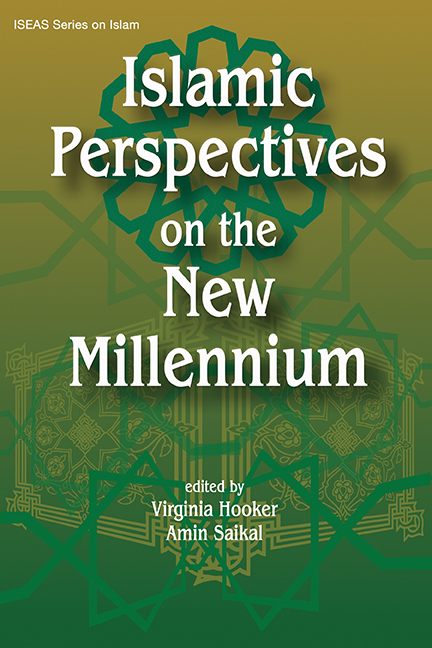Book contents
- Frontmatter
- Contents
- Acknowledgements
- Contributors
- 1 Islamic Perspectives on the New Millennium
- The New World Order
- The New Age
- The Economy
- 6 Financial Activism among Indonesian Muslims
- 7 Islamic Banking and Finance: In Search of a Pragmatic Model
- The Nation-State
- Muslim Women
- Law and Knowledge
- Conclusion
- Glossary
- Index of Names
- Index of Subjects
7 - Islamic Banking and Finance: In Search of a Pragmatic Model
from The Economy
Published online by Cambridge University Press: 21 October 2015
- Frontmatter
- Contents
- Acknowledgements
- Contributors
- 1 Islamic Perspectives on the New Millennium
- The New World Order
- The New Age
- The Economy
- 6 Financial Activism among Indonesian Muslims
- 7 Islamic Banking and Finance: In Search of a Pragmatic Model
- The Nation-State
- Muslim Women
- Law and Knowledge
- Conclusion
- Glossary
- Index of Names
- Index of Subjects
Summary
During the twentieth century, with the emergence and intensification of a global Islamic revivalist movement, calls were made to transform the existing political, legal, social, and economic institutions of Muslim societies into institutions that were more in line with Islamic norms and principles. In this context, from the mid-twentieth century Islamic banking and finance were given a considerable boost at both the theoretical and practical levels. They have since constituted a discourse that reflects the aspirations of Muslims to be “authentic” and true to their tradition, while at the same time remaining part of the ongoing and rapid changes that are occurring in the world today. Hence, Muslims are faced with a problem. To what extent should they remain faithful to the ideals that are enunciated in the foundation texts of Islam? In other words, they find themselves needing to be pragmatic to keep up with the changes that are occurring in the world. An examination of some key aspects of Islamic banking and finance will thus shed light on the whole question of idealism versus pragmatism in the Islamic revivalism of the late twentieth and early twenty-first centuries.
Muslim economists who argue for an Islamic model of banking and finance constantly turn to the Qur'an and the Sunna, as well as past interpretations of these texts, to seek guidance. From the 1950s onwards, economic and financial matters that were dealt with in classical fiqh works have been given a high degree of importance. Newly developed contracts and products for Islamic banking and finance are often justified on the basis of what classical jurists proposed or formulated. It is also common to find arguments for or against a particular contract or product based on arguments that were advanced by classical jurists such as Malik b. Anas (d. 179 AH), Sarakhsi (d. 483 AH), Ibn Rushd (d. 595 AH), or by other figures who on occasion wrote on economic issues, such as Abu Yusuf (d. 182 AH), Yahya b. Adam (d. 203 AH), and Ibn Khaldun (d. 808 AH). The precedents of the past 1,400 years have thus become an important part of how and what the Islamic banking and financial system should be. In constructing such a system, because of the diversity of approaches, interpretations, and understandings, Muslims in the late twentieth century naturally differed on how a contemporary Islamic banking and financial system should be conceptualized.
- Type
- Chapter
- Information
- Islamic Perspectives on the New Millennium , pp. 113 - 130Publisher: ISEAS–Yusof Ishak InstitutePrint publication year: 2004



